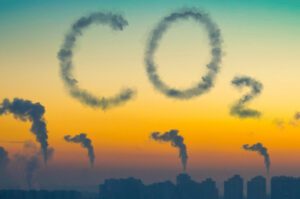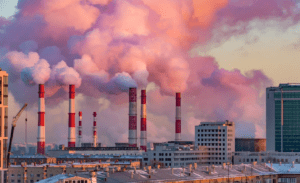
Shifting the burden of financing decarbonization onto taxpayers would be wrong, Ambassador of the European Union (EU) to Ukraine Matti Maasikas expressed this position at the discussion titled “Decarbonization. What is the Ukrainian way?”
“The polluter must pay. The authorities must work more boldly with this,” the ambassador said.
According to him, the payment for CO2 emissions is EUR 0,15 per tonne in Ukraine, while over EUR 50 in the EU.
First Deputy CEO of Interpipe Denys Morozov said that business is ready to invest in decarbonization, but with the support of the government, these efforts will have a greater effect. Morozov said the company made the largest environmental investment of about $1 billion without government support ten years ago, when no one spoke about Green Deal, having built an innovative electric steel-smelting complex Interpipe Steel instead of the environmentally dirty open-hearth production and reducing CO2 emissions by ten times.
According to him, Interpipe, which exports 85% of its products, is increasingly receiving requests for environmental audits from its customers, and now the company is completing the development of a long-term Decarbonization Strategy.
“Despite the presence of a modern metallurgical plant that meets all EU environmental standards, we still need support from the government. First of all, it concerns the availability of scrap metal, which is a critical raw material for decarbonization,” Morozov said. He called for leaving all scrap in Ukraine, since without it the country will not be able to decarbonize metallurgy and achieve the goals of the Green Deal.
The second problem, he called the lack of sufficient industrial access to cheap low-carbon and “green” electricity, in particular, nuclear power plants.
DTEK Executive Director Dmytro Sakharuk said the main requirement for the state is predictability.
“Long-term investments need a stable environment […]. We are ready to pay, but we need trust [in the actions of the authorities] and stability,” he said.
According to Sakharuk, the reduction of feed-in tariffs resulted in almost 1 GW of green electricity not being generated in 2021 and an additional 2 million tonnes of CO2 will be emitted.
Deputy Prime Minister for European and Euro-Atlantic Integration Olha Stefanishyna said it is important for business to get a strategy and the government is working on its own Ukrainian Green Deal.
She said there is a clear understanding of the need for financial resources for such a green transition, and this is also one of the government’s priorities.
According to Minister of Environmental Protection and Natural Resources Roman Abramovsky, Ukraine has already managed to agree on the idea of a Ukrainian Climate Fund, similar to the Energy Efficiency Fund, with the European Bank for Reconstruction and Development (EBRD), and by the end of September such an agreement can be completed with the World Bank.
According to Morozov and Sakharuk, one of the directions for using the fund’s resources could be compensation for interest rates, since in Ukraine they are significantly higher than in Europe. As the head of the Ecology Ministry said, it is possible.

Ukraine, in accordance with the Second National Determined Contributions of Ukraine (NOV2) to the Paris Agreement, shall reduce greenhouse gas emissions by 65% from 1990 levels by 2030.
This goal was set and approved by a resolution of the Cabinet of Ministers of Ukraine at an extraordinary meeting on Friday.
“The Cabinet of Ministers has approved Ukraine’s Second National Determined Contributions of Ukraine to the Paris Agreement. By decarbonization and the development of renewable energy sources, we intend to reduce greenhouse gas emissions to 35% of the 1990 level. Ukraine goes side by side with the EU and the United States in the fight against climate change,” Prime Minister of Ukraine Denys Shmyhal wrote on his Twitter page.
Ukraine’s initial contribution to the Paris Agreement, adopted by the Cabinet of Ministers in September 2015, aimed to reduce greenhouse gas emissions by 40% by 2030, i.e. up to 60% of the 1990 level.
The indicator of emission reduction by 65% by 2030 was obtained based on the calculation that in 1990, Ukraine’s emissions, taking into account land use and forestry, amounted to 884 million tonnes. At the same time, in 2019, according to the inventory, CO2 emissions amounted to 332 million tonnes – 37.6% of the 1990 level.
According to an explanatory note to the draft resolution of the Cabinet of Ministers, NOV2 will allow integrating environmental components into the updated development strategies of the state, taking into account the national circumstances of the development of the Ukrainian economy while implementing international obligations, and improving the image of Ukraine in the international arena and in climate negotiations.
According to the note, NOV2 will contribute to attracting additional technological and financial resources to modernize and transform the economy towards the implementation of the European Green Deal and mitigate the effects of climate change.
The document is to be submitted to the Secretariat of the United Nations Climate Change Convention in preparation for the 26th UN Climate Change Conference of the Parties (COP26), which will be held on November 1 through November 12 in Glasgow.